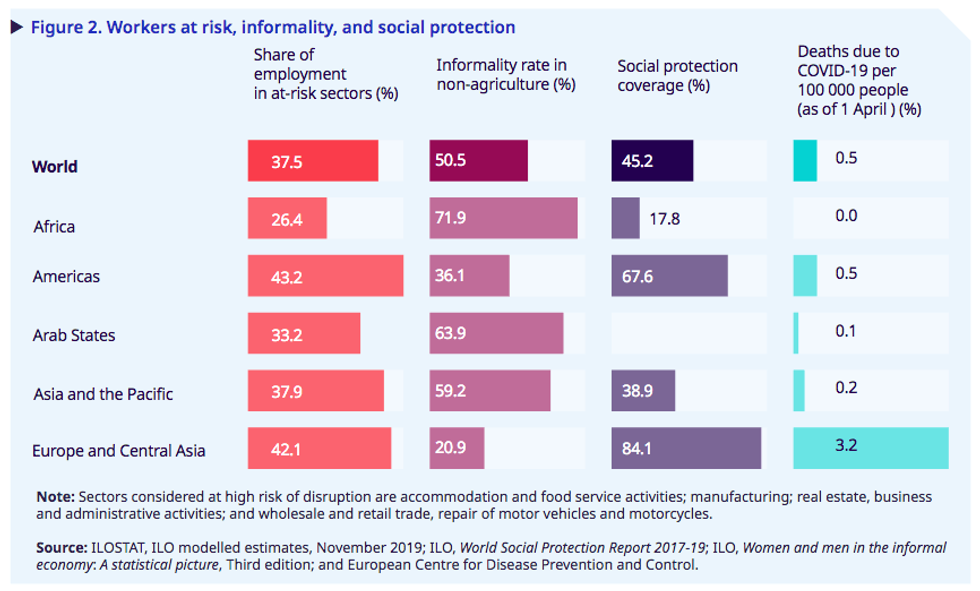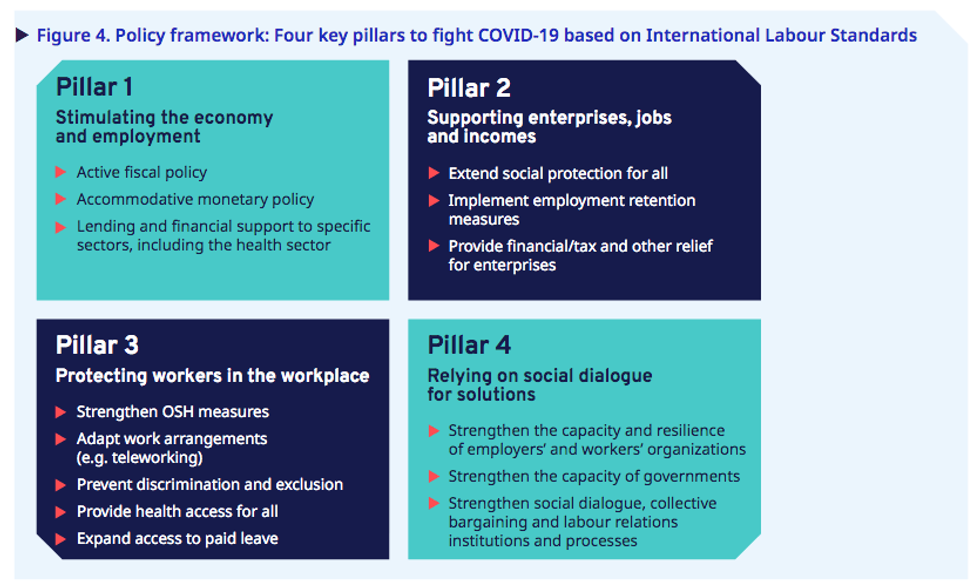As governments across the globe continue to grapple with how to best provide economic relief to workers and businesses impacted by the ongoing coronavirus pandemic, a new report from the United Nations labor agency warns that the public health crisis could cause working hours worldwide to decline by 6.7% in the second quarter of this year--the equivalent of 195 million full-time jobs.
While health officials have concluded that full or partial lockdowns are needed around the world to limit cases of COVID-19, the disease caused by the virus, the International Labor Organization (ILO) report (pdf) released Tuesday says such measures are having a "catastrophic" effect on the global economy and already affecting almost 2.7 billion workers, around 81% of the world's workforce of 3.3 billion.
Sangheon Lee, director of ILO's employment policy department and the report's main author, told the Guardian that the outbreak's impact on jobs was immediate.
"We started to see huge numbers in job loss claims, in the U.S., Canada, and most of the European countries," he said. "We expect that unless we have serious and immediate actions taken right now the recovery is going to be rather long and painful."
"This is the greatest test for international cooperation in more than 75 years," ILO Director-General Guy Ryder said in a statement. "If one country fails, then we all fail. We must find solutions that help all segments of our global society, particularly those that are most vulnerable or least able to help themselves."
According to the ILO report:
The majority of job losses and declining working hours will occur in hardest-hit sectors. The ILO estimates that 1.25 billion workers, representing almost 38% of the global workforce, are employed in sectors that are now facing a severe decline in output and a high risk of workforce displacement. Key sectors include retail trade, accommodation and food services, and manufacturing.
The agency says that "depending on the country context, these workers are facing a drastic and devastating reduction in working hours, wage cuts, and layoffs." This is especially the case for the 482 million workers around the world in wholesale and retail trade, "who are typically low paid and unprotected."
"Particularly in low- and middle-income countries, hard-hit sectors have a high proportion of workers in informal employment and workers with limited access to health services and social protection," the report explains. "Without appropriate policy measures, workers face a high risk of falling into poverty and will experience greater challenges in regaining their livelihoods during the recovery period."
Sectors facing a medium-high impact from the pandemic, according to ILO, include transport, storage, and the communication industry--from airline pilots to delivery workers--as well as arts, entertainment and recreation, and other services.
"We have to move fast, decisively, and together. The right, urgent, measures, could make the difference between survival and collapse."
--Guy Ryder, ILO
ILO ranks agriculture, forestry, and fishing as facing a low-medium affect from the crisis. However, the report adds that "although the economic impact has not yet been felt in agriculture, the largest sector in most of developing countries, risks of food insecurity are emerging due to containment measures, including border closures."
In addition to the ILO's dire projections about how the virus outbreak could impact workers and the world's economy, the report includes policy recommendations to ease the effects of the crisis, emphasizing the necessity of "immediate support for most-affected sectors and population groups, particularly for enterprises and workers operating in the informal economy."
Specific measures the agency highlights include cash transfers to those most affected by the lockdowns and shifting to the production of crucial supplies such as personal protective equipment to provide continued employment, both of which should accompany continuous efforts to ensure everyone has access to essentials like food.
Governments' and global organizations' formal responses to the pandemic, the ILO says, should be guided by four pillars:
"Workers and businesses are facing catastrophe, in both developed and developing economies," ILO's Ryder warned. "We have to move fast, decisively, and together. The right, urgent, measures, could make the difference between survival and collapse."
"The choices we make today will directly affect the way this crisis unfolds and so the lives of billions of people," he added. "With the right measures we can limit its impact and the scars it leaves. We must aim to build back better so that our new systems are safer, fairer, and more sustainable than those that allowed this crisis to happen."


